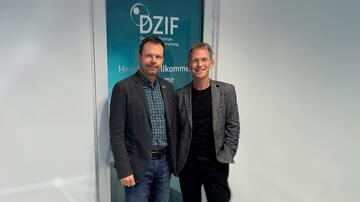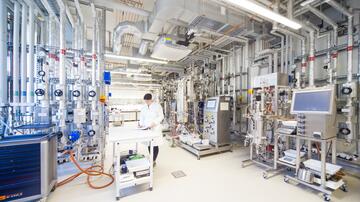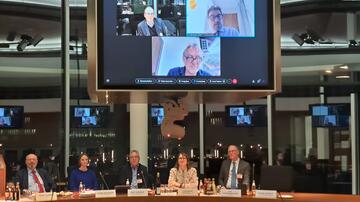Andreas Peschel receives the DZIF Prize for Translational Infection Research 2017
For over 20 years, Professor Andreas Peschel from the Interfaculty Institute of Microbiology and Infection Medicine Tübingen (IMIT) and the German Center for Infection Research (DZIF) has dedicated his research to bacterial infections with Staphylococcus aureus. He has now received this year’s DZIF Prize for Translational Infection Research in honour of his scientific achievements. The Prize, worth 5,000 euro, was awarded at the joint Annual Meeting of the German Society of Infectious Diseases (DGI) and the DZIF in Hamburg.
Staphylococcus aureus causes severe infections, such as wound or bloodstream infections, particularly in people with compromised immune systems. Its increasing resistance to commonly used antibiotics makes it a dreaded typical “hospital pathogen”. It frequently colonises human nostrils—in every third person—and uses this reservoir to cause severe infections. In their research projects, funded by the DZIF, Andreas Peschel and his team discovered that Staphylococcus aureus is only rarely present when related Staphylococcus lugdunensis bacteria are also residing in the nose. As part of the human microflora, these bacteria produce an antibiotic that the discoverers termed “lugdunin”. The researchers now aim to clarify whether lugdunin can be used therapeutically in preclinical trials.
At the DZIF, Andreas Peschel is also further developing other new agents, alongside Lugdunin, to fight colonisations of Staphylococcus aureus. Another such agent is a highly effective protein derived from specific viruses called bacteriophages. It specifically kills Staphylococcus aureus bacteria within a very short time whilst maintaining the natural microflora. The project will soon be due to undergo phase I/IIa clinical trials.
Andreas Peschel’s research has been reported in many renowned original publications including Nature, Nature Medicine and Cell Host & Microbe. The list is over 150 publications long and they have been cited 13,000 times up to now.
Peschel’s research approach has always included a focus on translational infection research, i.e. rapidly getting results from basic research to benefit the patient. With this, Peschel follows the DZIF’s main mission. Antibiotic resistance was the main theme at this year’s joint Annual Meeting of the German Society of Infectious Diseases (DGI) and the German Center for Infection Research (DZIF) taking place from 28 to 30 September in Hamburg. About 500 scientists came together to discuss current research projects.
The prize winner
Andreas Peschel studied biology in Bochum und Tübingen. After working as a postdoctorate in Tübingen, Borstel and Utrecht, he returned to Tübingen as assistant professor in 2001. Two years later, he became associate professor and subsequently full professor in 2008. In his position, he dedicated himself to linking microbiologists from medical and scientific faculties, who often operate separately. This led to the establishment of the Interfaculty Institute of Microbiology and Infection Medicine Tübingen (IMIT). Since 2015, he has headed the Institute’s Department of Infection Biology. As a leading expert in staphylococci, Peschel is active in different research associations and committees. At the DZIF, he is Co-coordinator of the research field “Healthcare-Associated and Antibiotic-Resistant Bacterial Infections”.




